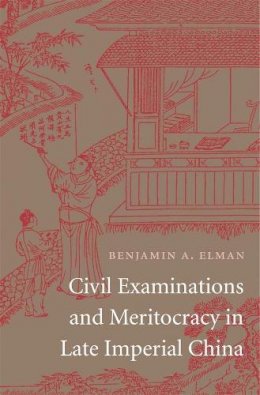
Civil Examinations and Meritocracy in Late Imperial China
Benjamin A. Elman
During China's late imperial period (roughly 1400-1900 CE), men would gather by the millions every two or three years outside official examination compounds sprinkled across China. Only one percent of candidates would complete the academic regimen that would earn them a post in the administrative bureaucracy. Civil Examinations assesses the role of education, examination, and China's civil service in fostering the world's first professional class based on demonstrated knowledge and skill.
While millions of men dreamed of the worldly advancement an imperial education promised, many more wondered what went on inside the prestigious walled-off examination compounds. As Benjamin A. Elman reveals, what occurred was the weaving of a complex social web. Civil examinations had been instituted in China as early as the seventh century CE, but in the Ming and Qing eras they were the nexus linking the intellectual, political, and economic life of imperial China. Local elites and members of the court sought to influence how the government regulated the classical curriculum and selected civil officials. As a guarantor of educational merit, civil examinations served to tie the dynasty to the privileged gentry and literati classes--both ideologically and institutionally.
China did away with its classical examination system in 1905. But this carefully balanced and constantly contested piece of social engineering, worked out over the course of centuries, was an early harbinger of the meritocratic regime of college boards and other entrance exams that undergirds higher education in much of the world today.
Product Details
About Benjamin A. Elman
Reviews for Civil Examinations and Meritocracy in Late Imperial China
R. Bin Wong, coauthor of Before and Beyond Divergence: The Politics of Economic Change in China and Europe This book, a remarkable feat of synthesis and analysis, is now the best and most comprehensive account we have of ‘what was going on inside’ the preindustrial world’s greatest single experiment in holding civil service examinations. It is also an eloquent and ambitious attempt to revise our understanding of the successes and failures of the empire of China in its last five or six centuries.
Alexander Woodside, University of British Columbia The most accomplished scholar of the examination system in China looks at the denouement of the story: the nineteenth and early twentieth century struggles between conservatives and revolutionaries to assign meaning to the history of the examination system, and to claim its legacy. The competing views illuminate not only the sources of our modern assumptions about the form and content of the examinations, but also the meaning given in the modern world to stylized intellectual competition and institutional transformation from within.
Pamela Crossley, author of A Translucent Mirror: History and Identity in Qing Imperial Ideology
